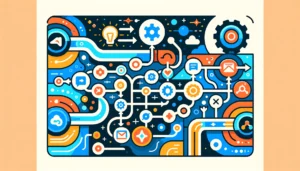Introduction
In the fast-paced world of technology and business, Artificial Intelligence (AI) Automation is emerging as a pivotal force in shaping the future of business operations. This blog post delves into the essence of AI Automation, its applications across various industries, the significant benefits it offers, the challenges businesses might face in its implementation, and the exciting future trends in this field.
What is AI Automation?
AI Automation, often referred to as Intelligent Automation (IA) or Hyperautomation, combines artificial intelligence, robotic process automation (RPA), and business process management to streamline operations that traditionally required manual intervention. By incorporating advanced approaches like cognitive computing and data mining, AI enables smarter, more adaptable business decisions, handling tasks that require decision-making and foresight
Industry-Specific Applications of AI Automation
- Customer Support: AI chatbots integrated into business websites and social channels provide round-the-clock customer service, enhancing customer experience and efficiency.
- Cybersecurity: AI in cybersecurity helps detect threats, repel attacks, and predict future breaches, safeguarding business and customer data.
- Recruiting: AI streamlines the recruiting process, managing tasks like outreach and scheduling, thereby giving recruiters more time for meaningful candidate engagement.
- Sales and Marketing: AI aids in customer data insights, outreach, and predictive forecasting, optimizing sales and marketing efforts.
Highlighting the Benefits of AI Automation
AI Automation offers numerous benefits to businesses:
- Increased Efficiency: Streamlines operations, reducing time on routine tasks.
- Cost Savings: Lower operational costs through automated processes.
- Improved Decision-Making: Offers data-driven insights for better business decisions.
- Enhanced Customer Experience: Provides personalized customer interactions.
- Scalability: Facilitates business growth with scalable AI solutions.
- Data Analysis and Insights: Offers deep insights from large data sets.
- Improved Security: Enhances cybersecurity measures.
Addressing Challenges in AI Automation Implementation
Implementing AI Automation is not without its challenges. Businesses often face issues with integrating AI into existing systems, the need for skilled personnel, and managing initial investment costs. Addressing these challenges requires a strategic approach, including employee training, choosing the right AI partners, and phased implementation strategies.
Here’s a deeper look into these challenges and how they can be addressed:
Integration Complexity: Integrating AI into existing business systems can be a significant hurdle. To address this, businesses should focus on modular AI solutions that can easily integrate with existing infrastructure. Partnering with AI vendors that offer customizable solutions and robust support can also be beneficial.
Skill Gap: The successful implementation of AI requires a certain level of technical expertise. Businesses can bridge this gap by investing in training programs for existing employees and hiring new talent with relevant AI skills. Collaborations with academic institutions or specialized training providers can be effective in building the necessary skill sets.
Data Management: Effective AI implementation requires high-quality data. Businesses should focus on establishing robust data governance frameworks to ensure data accuracy, quality, and security. This includes regular audits, adherence to data protection regulations, and investment in data management tools.
Cost Management: Initial investment in AI can be high. To manage costs effectively, businesses can start with pilot projects to demonstrate ROI before scaling up. Leveraging cloud-based AI solutions can also reduce upfront costs.
Cultural Resistance: Employees might resist AI implementation due to fear of job loss or change. Addressing this requires clear communication about the role of AI in augmenting human work, not replacing it. Regular training and involvement in AI projects can also help in easing the transition.
Future Trends in AI Automation
The future of AI Automation looks promising, with trends indicating advancements in machine learning, predictive analytics, and more.
As AI technology continues to evolve, several key trends are likely to shape the future of AI Automation:
Advancements in Machine Learning and Deep Learning: These technologies will become more sophisticated, enabling AI systems to make more accurate predictions and decisions.
Greater Integration with IoT: The Internet of Things (IoT) will increasingly work in tandem with AI, leading to more interconnected and intelligent systems.
Ethical AI and Bias Mitigation: As AI becomes more prevalent, there will be a greater focus on developing ethical AI systems that mitigate bias and ensure fairness in decision-making.
AI Democratization: The trend towards democratizing AI will continue, making AI tools more accessible to non-technical users. This will allow more businesses, regardless of their size or technical capability, to leverage AI solutions.
Autonomous Operations: We will see an increase in fully autonomous systems in industries like transportation, logistics, and manufacturing, driven by advanced AI and robotics.
AI in Edge Computing: The growth of edge computing will see AI being deployed closer to where data is generated, leading to faster and more efficient processing.
These trends indicate a future where AI Automation is more advanced, accessible, and integrated into the fabric of business operations.
Conclusion
AI Automation is undeniably revolutionizing the way businesses operate, offering a myriad of benefits while also posing certain implementation challenges. As we look ahead, the continued evolution of AI promises to unlock even greater potential for business transformation.
Eager to explore how AI Automation can benefit your business? Check out our solutions for expert insights.





